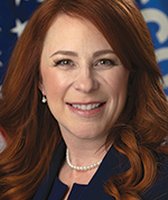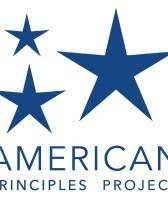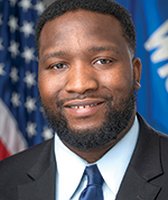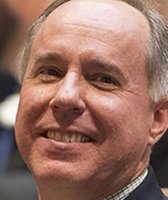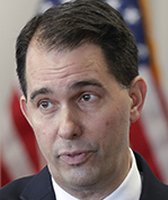Stand up for the facts!
Our only agenda is to publish the truth so you can be an informed participant in democracy.
We need your help.
I would like to contribute
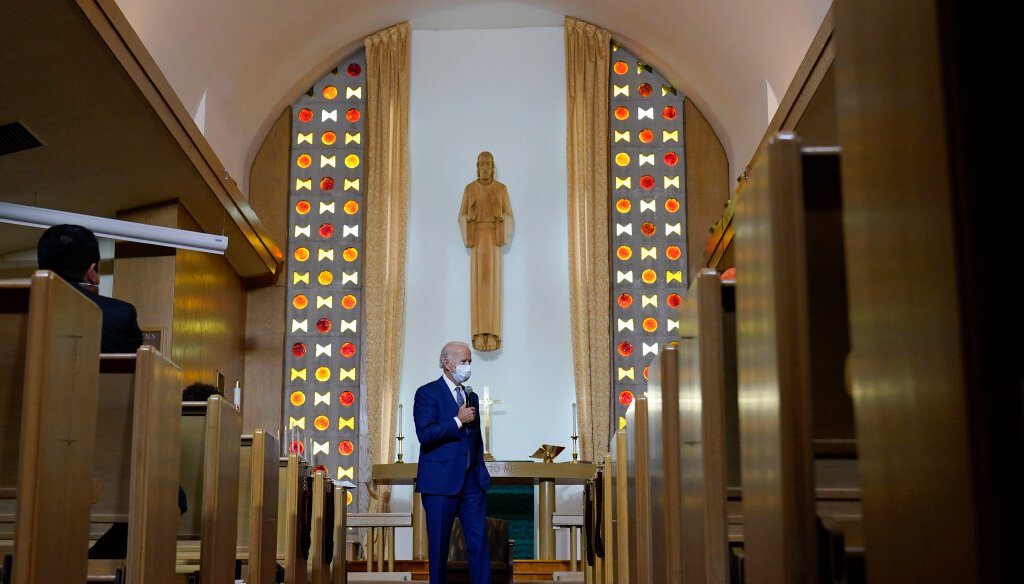
Democratic presidential candidate former Vice President Joe Biden speaks as he meets with members of the community at Grace Lutheran Church in Kenosha, Wis., Thursday, Sept. 3, 2020. (AP Photo/Carolyn Kaster)
Editor's note: This story has been updated to correctly quote what Biden said about taxes for the top 0.1% of income earners. Biden claimed that group got a tax cut of $1.35 trillion, which the story accurately noted is wrong. But the figure was incorrectly transcribed in the quote.
In his first in-person appearance in Wisconsin, Democratic presidential nominee Joe Biden used a Sept. 3, 2020, trip to Kenosha to take aim at President Donald Trump on taxes, COVID-19 and race, among other topics.
Biden whiffed on numerical claims about people of color in frontline positions and taxes for the rich, but he stayed more true to the facts on several other key claims.
Here’s what we found
Biden was talking about risks to people of color serving as frontline workers amid the coronavirus pandemic.
But his "most" claim is wrong.
About 60% of workers in grocery, convenience and drug stores are white, according to an April 2020 study on frontline workers from the Center for Economic Policy Research. They based their findings on the U.S. Census Bureau’s American Community Survey from 2014-18.
That’s roughly in line with more general tallies the U.S. Bureau of Labor Statistics has reported in its breakdowns by job. The 2019 Current Population Survey reports 69.2% of cashiers are white, and a category listed as "Laborers and freight, stock, and material movers, hand" is 72.4% white.
The policy research report supports Biden’s general point, saying "People of color are overrepresented in many occupations within frontline industries," but Biden overreaches claiming they comprise a majority.
This is a largely accurate synopsis of a study on this subject.
A May 29, 2020 analysis from Columbia University found that the U.S. could have prevented about 36,000 coronavirus deaths if social distancing measures had taken effect widely just one week earlier in March. The study is a pre-print, meaning it has not yet been peer-reviewed.
The Centers for Disease Control and Prevention advised on March 15, 2020 against gatherings of 50 people or more, and the governors of Washington state and Illinois ordered all bars and restaurants closed. By the next day, schools across the country began to close.
By analyzing the path of the virus while widespread restrictions were in place across the nation, researchers found that had those restrictions been enacted one week earlier, on March 8, 2020, the U.S. would have avoided 645,660 coronavirus cases and 35,287 deaths.
Here’s the full quote from Biden: "White supremacists, Ku Klux Klan — young woman was killed protesting those folks, and the president of the United States was asked what do you think, and he said something no president has ever, ever said. He said, "There are very fine people on both sides.’ "
Trump made this comment Aug. 15, 2017, at a news conference about an unrelated executive order. He was asked about his response to violence in Charlottesville, Va., where two days earlier a car had careened into a group of counterprotesters at a "Unite the Right" rally of white nationalist and other right-wing groups. Heather Heyer, 32, was killed.
An April 2019 PolitiFact National story explaining the context behind the exchange said a reporter — during a lengthy back and forth with Trump — asserted neo-Nazis "started this," to which Trump interjected:
"Excuse me, excuse me. They didn’t put themselves -- and you had some very bad people in that group, but you also had people that were very fine people, on both sides. You had people in that group. Excuse me, excuse me. I saw the same pictures as you did. You had people in that group that were there to protest the taking down of, to them, a very, very important statue and the renaming of a park from Robert E. Lee to another name."
After some back and forth about statues, Trump goes on to say this, which can be read as elaborating on his prior remark:
"I’m not talking about the neo-Nazis and the white nationalists -- because they should be condemned totally. But you had many people in that group other than neo-Nazis and white nationalists. Okay? And the press has treated them absolutely unfairly."
In other words, Biden’s description of the quote and context are largely accurate, though the question put to Trump wasn’t quite as simple as Biden presented it and Trump later appeared to elaborate on his point.
This one-off statement from Biden is presumably a reference to the Tax Cuts and Jobs Act, a series of tax cuts passed under Trump that run through 2025.
The cuts disproportionately benefit higher income earners, but Biden’s number is nowhere near the tallies from analyses we found.
The Urban Institute-Brookings Institution Tax Policy Center, an independent group that models the effects of tax legislation, said the average tax cut in 2018 for the top 0.1% was about $190,000, or a total of about $27 billion for that year. Even if that group had savings at that level every year of the tax cut, it’s nowhere near the tally Biden claimed.
Related: ‘Honest’ ad mostly wrong about Trump, taxes and Medicare
The tax cut across all income brackets is expected to total $1.8 trillion over the next decade, according to a June 2018 analysis from the Tax Foundation, a think tank that generally has a pro-business leaning.
This is partly accurate.
Biden made a similar claim in a May 28, 2019 position paper highlighting his education platform if he were elected president, although at that time he said that "the current school psychologist to student ratio in this country is roughly 1,400 to 1."
PolitiFact National rated that Mostly True in June 2019. The most recent and widely touted data on the nation’s school psychologist shortage at the time came from a 2015 member survey of the National Association of School Psychologists (NASP), a trade group based in Washington, which found there were 1,381 students for every school psychologist that year.
But in statistics from the 2015-16 National Teacher and Principal Survey, about 49 million kids were enrolled in public schools with about 44,210 full-time school psychologists. That’s a ratio of about 1,115-to-1.
Biden highlighted this ratio to underscore a point that the country needs to invest more in mental health services — and, to be sure, there is a shortage of psychologists in America’s public schools, as NASP recommends one school psychologist for every 500 to 700 students.
Biden was on target with his general point that there is a shortage, but off on the exact number.
Here’s Biden’s full quote: "As much as they say Black Lives Matter has lost some standing since the president’s gone on this rant about, you know, law and order, etc. (We) still have over 50% of the American people supporting it. It was up to 70-80%. That’s never happened before."
This is close to accurate.
A new survey from the Pew Research Center conducted from June 4-10, 2020 found that two-thirds, or 67% of U.S. adults, say they support the Black Lives Matter movement. That’s way up from a 2016 Pew survey, which found 43% of Americans supported it.
The 2020 analysis shows support is higher among communities of color — 86% of Black Americans, 77% of Hispanic Americans and 75% of Asian Americans surveyed said they supported the movement, compared to 60% of white people surveyed.
A later poll from the Washington Post and ABC News, conducted July 12-15, 2020, found that 63% of Americans said they supported the movement. For white Americans, that dropped to 54%, compared with 74% of Hispanic Americans and more than nine in 10 Black Americans.
No significant polls addressing support for Black Lives Matter have been published since the shooting of Jacob Blake in Kenosha on Aug. 23, 2020, although a Sept. 3, 2020 poll from the research firm Ipsos found that 43% of Americans supported protests and demonstrations in the wake of that shooting, deeply divided on political lines.
Biden is close on the first part of his claim: As protests over the death of George Floyd occurred nationwide earlier this summer, Americans’ overall support for the Black Lives Matter movement was nearly 70%, and higher for some groups.
But it appears that support for the movement hasn’t sunk broadly as he described, rather just among white Americans. Others still support it at higher levels.
Our Sources
Center for Economic and Policy Research, "A basic demographic profile of workers in frontline industries," April 2020
U.S. Bureau of Labor Statistics, Labor force statistics from the current population survey, accessed Sept. 3, 2020
Columbia University, "Differential Effects of Intervention Timing on COVID-19 Spread in the United States," May 29, 2020
National Public Radio, "U.S. Could Have Saved 36,000 Lives If Social Distancing Started 1 Week Earlier: Study," May 21, 2020
Washington Post, "Charlottesville mourns woman killed in rally that turned violent," Aug. 16, 2017
Politifact National, "In Context: Donald Trump’s ‘very fine people on both sides’ remarks (transcript)," April 26, 2019
Tax Foundation, The Distributional Impact of the Tax Cuts and Jobs Act over the Next Decade, June 2018
Tax Policy Center, Distributional analysis of the conference agreement for the Tax Cuts and Jobs act, Dec. 18, 2017
Interview with Alyssa Hackbarth, spokeswoman for the Tax Foundation, Sept. 3, 2020
Politifact National, "Biden highlights the nation’s lack of school psychologists," June 5, 2019
National Association of School Psychologists membership surveys, 2014-15 school year
National Teacher and Principal Survey, 2015-16
Pew Research Center, "Amid Protests, Majorities Across Racial and Ethnic Groups Express Support for the Black Lives Matter Movement," June 12, 2020
Pew Research Center, "How Americans view the Black Lives Matter movement," July 8, 2016
Washington Post, "Americans support Black Lives Matter but resist shifts of police funds or removal of statues of Confederate generals or presidents who were enslavers," July 21, 2020
National Public Radio, "Americans Increasingly Polarized When It Comes To Racial Justice Protests, Poll Finds," Sept. 3, 2020







